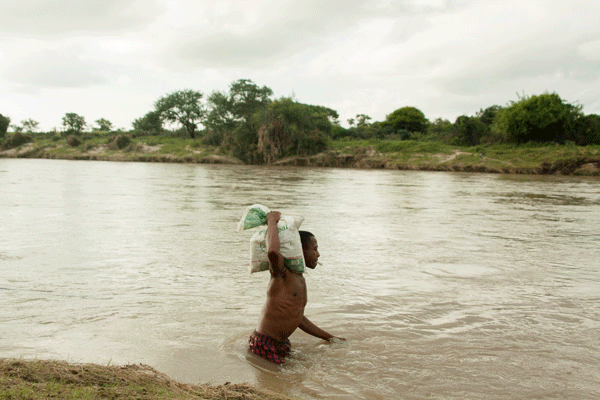
“These bridges were built by Ian Smith’s government, I was born in 1978 and this has always been the bridge I’ve known; now it’s broken.
BY KHUMBULANI MPOFU

“So from 1978 until now, this new Zimbabwe, I haven’t seen anything new. Nothing.”
These are the lamenting words from Nkosilathi Khumalo (38), from Sibhula village under Chief Khulumani Mathema in Gwanda District.
Sibhula, 41km south westerly of Gwanda town, is surrounded by the Hovi and Maleme rivers, which have their sources somewhere in the Matobo National Park and are tributaries of Tuli River.
For over three weeks now, Khumalo and more than a thousand other villagers from Sibhula and Masakeni have had their lives turned upside down because the old bridge connecting the two communities collapsed under strain from a flooded Hovi River.
The damage has cut them off from other areas and they have no access to either health facilities or schools.
- Chamisa under fire over US$120K donation
- Mavhunga puts DeMbare into Chibuku quarterfinals
- Pension funds bet on Cabora Bassa oilfields
- Councils defy govt fire tender directive
Keep Reading
The primary and secondary schools which service the community are on the island village and consequently, scores of pupils from the Masakeni area have not been going to school since the collapse of the bridge.
The Standard caught up with Khumalo on Wednesday late afternoon after he had just crossed the flooded Hovi River back to Masakeni.
His maize field is across the river in Sibhula and he lives in Masakeni.
“It’s the first time I’ve ever seen Hovi River this flooded. Life has been difficult,” Khumalo said.
“Last month we had to carry the body of a man who had died at Gwanda Hospital, his home is across the river in Sibhula.
“As families, we had to make a plan and four men came together and carried his body across the River because Nyaradzo funeral services could not do anything.”
He added: “It was risky but because we are all family here, and life has to go on, we organised four men to assist carry his body across the river.
“We would appreciate it if our government built new infrastructure for us, we need new schools, proper roads and bridges.
“Right now the only form of development I have witnessed is the water pump and irrigation project that were commissioned by Dabane Trust.
“But because of the floods, that’s all been damaged and we are now back to drinking unsafe water from the river.”
Mercymore Ncube (22), a mother of one, sat by the banks of the Hovi River with some food stuffs wrapped in a sack, as she patiently waited for some young men who are strong enough to swim across the river so they can deliver food to her three young cousins who have been staying with their grandmother in Sibhula since the bridge collapsed.
“I’m here to look for people to take food for our children across the river. This river has been flooded for three weeks and the bridge collapsed, so people can no longer move normally” Ncube said.
Two weeks ago, the Civil Protection Unit dispatched a helicopter which delivered food and medical supplies to the stranded villagers, 50 of whom are on anti-retroviral treatment (ART) and 10 on TB treatment.
According to some reports, at least 251 people died, 128 were injured, 1 576 stranded while 1 985 were displaced after the floods which President Robert Mugabe has declared a state of disaster.
Wellington Ncube (29) a good swimmer who was on hand to help his cousin Mercymore get the food across the river, also echoed the voices of others who appealed to the government to assist them by rebuilding the damaged infrastructure.
“Our MP, Madodana Sibanda did make an effort to come and address us, but because the bridge collapsed, he spoke to us from across the river,” he said.
Many of the children from the Masakeni side of the village have been spending time catching fish with their elder cousins and sometimes studying, while hoping that the water levels in both Hovi and Maleme subside.










